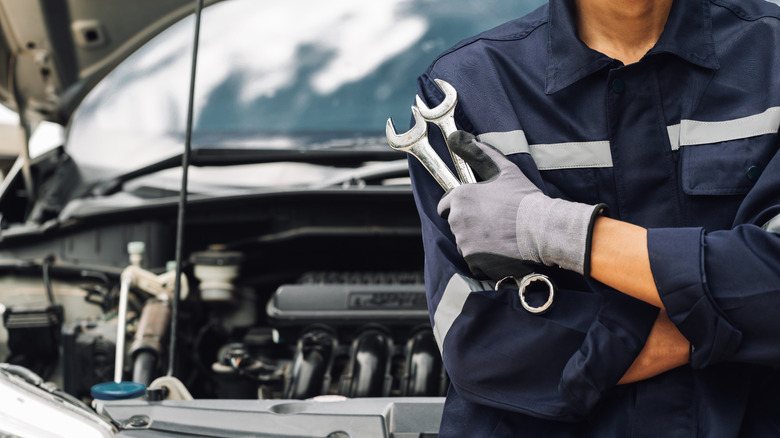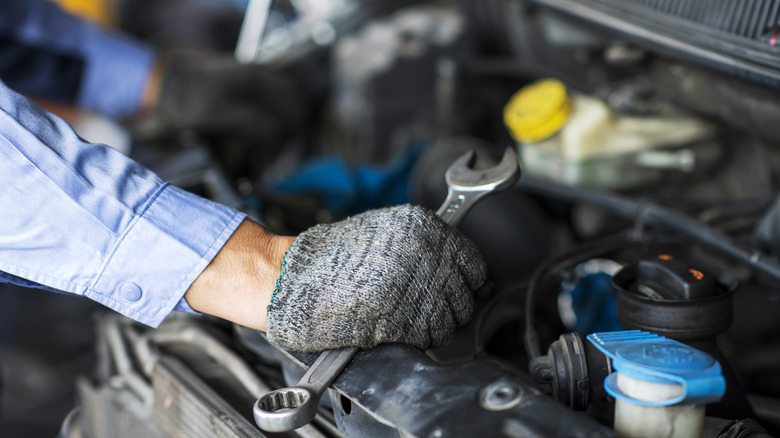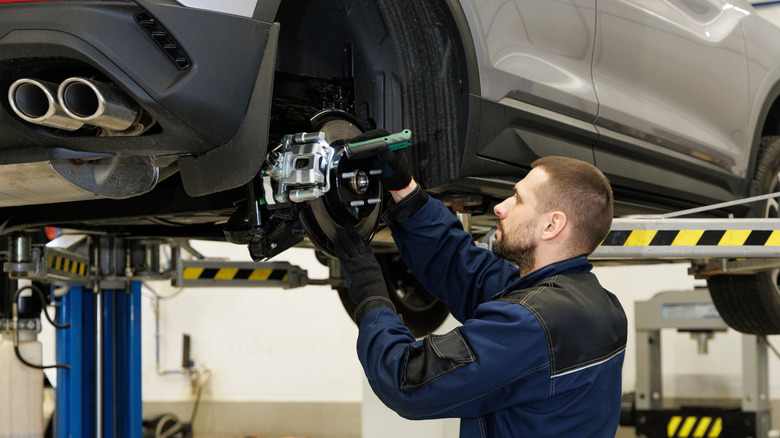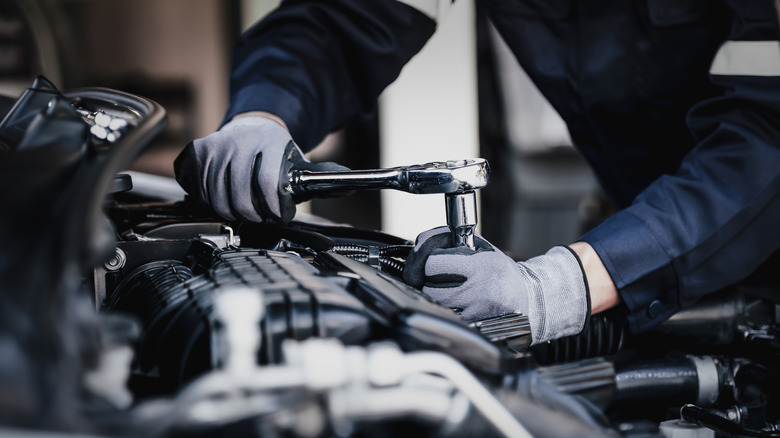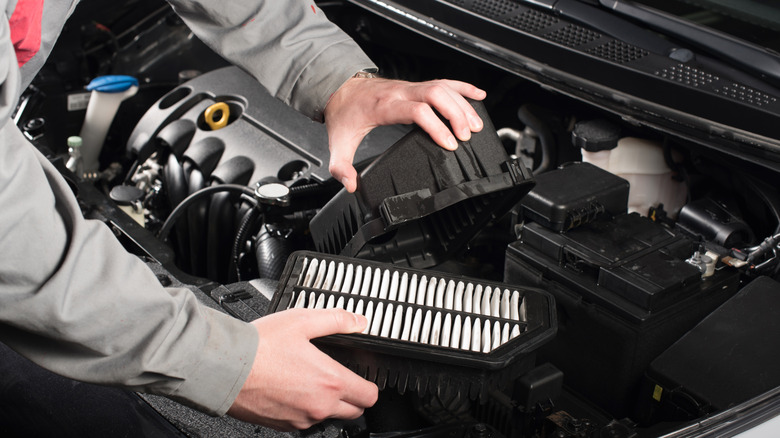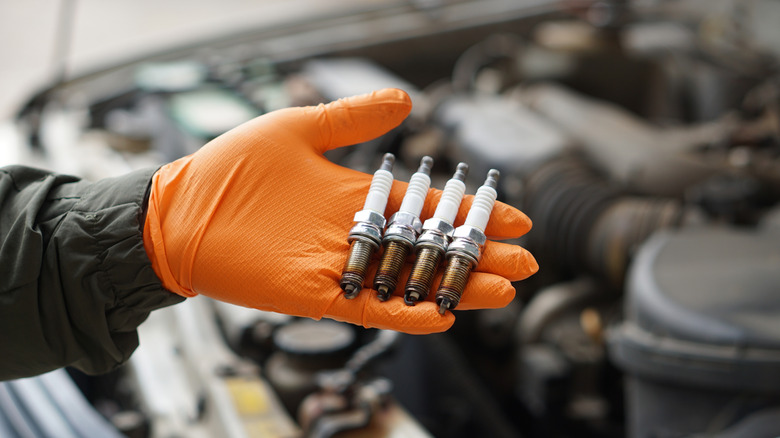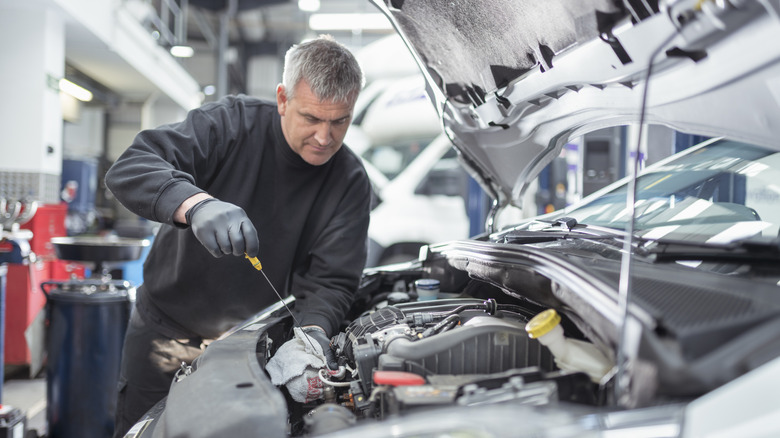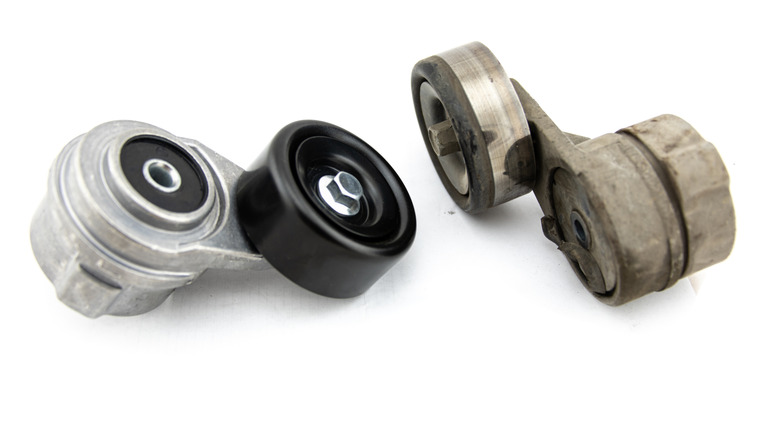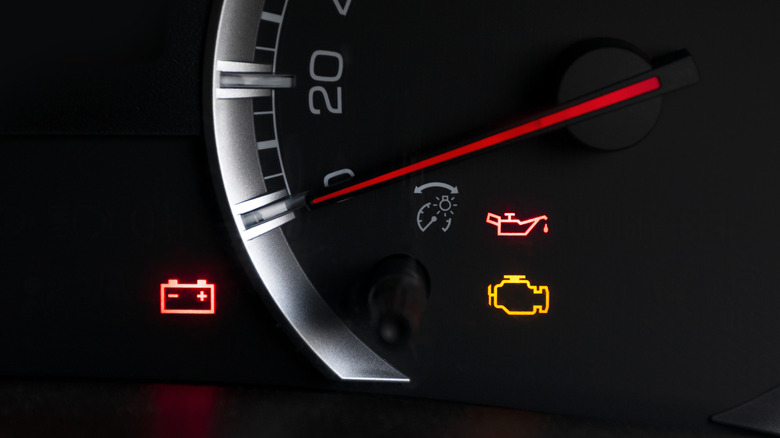11 Common Car Mechanic Scams (And How To Avoid Them)
Too many people know the pain of dealing with a less-than-reputable auto mechanic. The occurrence is seared into the pop culture of our modern world because auto mechanics work within a critically important subsection of the service arena. They are highly skilled fixers who rely on a bevy of specialized tools and a reservoir of technical know-how. While there are many auto body and engine maintenance tasks you can handle on your own, the professional mechanic remains a massively important resource. This vaunted status also delivers a knowledge and power imbalance that makes car owners ripe for the picking.
I've been on the receiving end of both great service and seriously suspect behavior. I've been a car owner for more than half my life and unfortunately heard plenty of scam pitches, including an offer to laser my brake discs to improve performance. I'm not a mechanic, but have had all manner of issues serviced and worked on a variety of troubles under the hood myself.
Thankfully, most auto mechanics are honest folks. They diagnose problems on a daily basis and do their best for customers. Still, that's not always the case, and some mechanics weaponize problems for their own benefit. Naturally, you'll want to look online at reviews before taking your vehicle to any garage you aren't familiar with, but there are actually a number of other ways to protect yourself from scams. These are some of the most common troubles car owners run into and a few important resources to help avoid becoming a victim.
Overcharging for parts and labor
The easiest scam to understand when it comes to the auto shop lies in markups. Naturally, a mechanic charges customers both for the labor they put into a vehicle and necessary parts and supplies required to get the job done. However, since much of what a mechanic does goes unseen there's plenty of wiggle room.
The average mechanic charges between $75 and $130 per hour for labor. This can fluctuate based on the rigors of the particular job at hand, location, or expertise. Unfortunately, while average rates might be easy to come by, it's much harder to say how many hours any particular job should require. An unscrupulous mechanic might quote you a price for four hours knowing they'll get the job done in three. It's difficult to fight back against this kind of overcharge, but bringing your car to a mechanic you trust and searching for some basic information about the specifics of the job you require can help steer you away from this situation.
Another issue comes in the price of parts. Hunting around before bringing your car into the mechanic or getting your quote and then looking up the cost of parts on your own will give you an idea of the fairness in a mechanic's estimate. Doing as much research as you can to bring your own knowledge to the table will help defend you against these kinds of markups in all regards.
Verbal quotes that turn into high bills
Before any work is done on your car, you should always get a written quote that explains what will be done. A written quote offers a basic framework to explain what's wrong with your car and the steps that will be taken to fix it. A quote not only helps you make sense of the work, but is also a step that can protect you against scams in the auto mechanic world.
A mechanic that doesn't provide a written quote is almost certainly one that's looking to pull a fast one on you. There's no reason why a reputable mechanic wouldn't write down their recommendations for fixing your vehicle, and this should always stand as a red flag when seeking out a service provider. Without a written explanation of the work that needs to be done and a basic framework for the cost, there's no accountability protecting you in the event of a misunderstanding or a straight up scam. With a piece of paper detailing these elements, a reputable mechanic can't change the terms on you later.
A scammer might offer verbal assurances that the work is minor and that you'll have your car back in a day, only to turn around and tell you that they never promised these things at all. Since your car is physically in a mechanic's garage, there is an added power dynamic that can make it hard for you to stand up for yourself. A written quote resolves this tension.
Repair work is done before confirming the job with you
In addition to written specifics about the job, no garage should ever perform work on your vehicle without getting explicit approval from you, the car owner. Just because an estimate has been delivered to you does not mean that you have accepted the quotation. Some scammers will take it upon themselves to engage in a variety of fixes and then suggest that you have to pay them in order to get your car back. As the work is supposedly already done, you might feel like you have no choice but to assent to these demands.
There are two problems found in this unscrupulous behavior. First, a mechanic can't keep your vehicle from you like this. Under normal circumstances, you'll pay for the services performed before taking your keys back, but in reality the vehicle is yours and anyone who holds it without a mechanic's lien — which can only be applied for work done that was agreed to by both parties — is breaking the law. This typical order of business provides unsavory characters cover for their misbehavior, but they really don't have a leg to stand on.
More importantly, if you have not given your consent to perform services on your vehicle, a mechanic cannot enact those changes and then charge you for them. The mechanic is working on their own volition if they do this, and anything that comes of that action is their problem. I personally know someone who had additional work performed on their vehicle once without secondary approval for the extras, and the repair shop eventually ate the cost of this added work.
Additional, unnecessary repairs
Due to the nature of automotive repair, it can be difficult to diagnose a problem in its entirety. It's uncommon for you to bring your car into a shop and have every system beyond the problem area working in absolutely perfect order. Therefore, you may sometimes run into scenarios in which additional, optional replacements or upgrades might be worthwhile.
A reputable mechanic might suggest you look into these additional repairs, but will stress that it isn't necessary to allay the issue you brought your car in to solve. If you have a problem with your brakes, a mechanic that suggests performing some kind of maintenance on the engine might be acting as a concerned helper – but you could also be speaking with a scammer.
There are a few key features to look out for. In this example, it's unlikely that a mechanic performing a brake pad replacement will need to check your engine at all. If the shop offers a full diagnostic check-up as a standard practice, or you ask for one, this may be a reasonable upselling opportunity. However, a mechanic that goes out of their way to explore other areas of your car in search of problems may be hunting for opportunities to take advantage of you. A brake issue isn't likely to result in a full rebuild. A mechanic suggesting that you get new brake fluid, replace pads, and calipers is likely one that's looking to overcharge you.
An unwillingness to field questions about the car or their suggested works
An auto mechanic is a salesperson. These professionals diagnose your vehicle and suggest the appropriate repairs, attempting to sell you on their services. This means that mechanics may be enticed to upsell you on additional work that they can perform while treating the underlying condition you're facing.
Since these professionals are trying to sell you on their expertise and abilities under the hood, they are typically warm and friendly when engaging in conversation with customers. As with any good salesperson, a mechanic will need to be prepared to answer questions. Even on a minor repair, there's a good chance you're looking at a bill in the three or four figure range. As such, you'll want to be certain that the repair is necessary and that this particular mechanic can get the job done. Asking questions is the best way to explore the nature of the solution and the suitability of the mechanic in tackling that problem.
A mechanic that's unwilling to answer questions is one that's trying to streamline the process of getting customers in the door and taking their money. It's important to remember that not everyone will be cheerful and personable. Some mechanics may come off as gruff and unfriendly but will perform a quality service and do it honestly. However, a mechanic that won't discuss their suggested fixes beyond a cursory overview might not be the best person for the job.
Technical jargon and no clear accompanying explanations
A mechanic who is looking to pull one over on you might also rely on lengthy, technical explanations for the services that they are offering. A truly deceitful mechanic might bill you for work that they don't actually do, However, one engaged in scam behavior can easily oversell the difficulty of the task and then upcharge you for the work. This approach relies on your inability to decipher what is being explained. If you don't understand the full picture it's easy for a mechanic to talk about how much work is involved in the task and then bill you for added hours or even additional parts that aren't necessary.
The best way around this scam tactic is to ask for a simplified explanation of the repair work. If a mechanic can't break this down into simple terms and distill the basics of what they will do to your car to fix it, you may not be working with an honest service provider. The reality is that a flashy pitch designed to upcharge you falls apart when breaking it down into its simplest form. The more you understand the work involved in fixing your vehicle, the less wiggle room a mechanic has to mess around with you and your finances.
Sudden air filter replacement pitches
Unfortunately, mechanics have been known in the past to hold onto dirty air filters that they've taken out of other cars. They use this old part as a prop in order to sell you on a last minute replacement. Frequently, this pitch will involve pulling your car into the garage and lifting it up so that it's out of reach. If you can't inspect the vehicle, you can't be sure that the part you're being shown is actually from your car. However, the logistics of removing parts from your vehicle sells the legitimacy of the pitch. Naturally, in the garage or up on a lift is where a mechanic will have your car when they are taking parts out of it.
Even so, if you didn't bring your vehicle in for a repair that involved the air filters, there should be no reason for a mechanic to remove one from your car. Therefore, air filters, and any other part that a mechanic might remove in order to show you a necessary replacement falling outside the scope of the original work is more than likely a scam of one type or another. You can and should decline part replacement pitches that take this form. Moreover, you might even consider asking for your car back right away so that you can take it to another mechanic to perform the required work.
Refusal to return old parts to you
Speaking of parts and replacements, it's important that all car owners remember one important feature embedded within their car, no matter its make or model. The car you bring into the shop for servicing is yours, and every individual part within the car also belongs to you. Whether it's a tiny bolt or spring or the entire engine block, every part that comes out of your vehicle remains yours.
Of course, it might be entirely efficient and beneficial to have the shop discard old parts that you no longer need. With a mechanic that you know and trust, this is often the best course of action and will save you the hassle of needing to throw away potentially problematic waste materials appropriately.
That said, if you are getting your car looked at by a mechanic you don't know, asking for the old parts back will verify that the work you have paid for has actually been done. If a mechanic can't produce a part they took out of your car, you can't be entirely sure that they actually made the change. As a result, any mechanic that refuses to provide you with removed parts is one that you should steer clear of. Any reputable mechanic in the business will be more than happy to hold on to these components to put you at ease. Only scammers that are looking to con you will balk at this idea.
Uncommon or hard to find part replacements
It's also important to have your radar up to detect scams involving replacement part requirements that involve difficult to access spaces or uncommon components that you are unlikely to be able to identify. Once again, bringing your vehicle in for one project only to have a mechanic suggest one or more additional fixes should be the first red flag. However, if those additional works involve an area of the car that you can't readily gain access to or don't frequently think about, you may be dealing with a scammer.
A call to replace things like ball bearings, front end brackets or bushings, and other oddities that don't typically come up in routine conversation (like changing out spark plugs or swapping a worn out oil filter to diagnose low oil pressure) should pique your interest. Anything that is hard for you to verify as a typical consumer should be something that gets your guard up.
Anytime this happens, your best course of action is to bring your car to another mechanic for a second opinion. Chances are, the first mechanic was looking to tack on additional charges. However, if you do indeed require these part exchanges, a reputable mechanic won't have any hard feelings about you getting a second quote and then choosing the best option for your needs.
Using counterfeit parts
Another scam that focuses on the parts used to build your car revolves around these components' origin story. The counterfeit part market for automobiles ranges across the entire spectrum of brands, from Ferraris (one brand in particular that takes the problem very seriously) to Fords. The U.S. Customs and Border Protection consistently seizes thousands of counterfeit parts every year, with a retail value estimated at more than $60 million in seizures over the last five years alone.
On the surface, it might not seem like this is a major consumer problem. However, the issue runs far deeper than company trademarks and corporate hand wringing. Components in your vehicle help it to perform at certain standards. Your seat belt, for instance, is rigorously tested. A counterfeit part won't be tested to the same standards, if even at all.
Brake pads, bolts that hold your engine in place, and your airbags – a part that NHTSA has alerted consumers to in the past – are all critically important components that help keep your car on the road and prevent catastrophes. Beyond the safety aspect of this problem, if a mechanic uses a counterfeit part to repair your vehicle, they are selling you something at full price while using a cut rate alternative to pocket the difference.
The low oil claim
Finally, a mechanic looking to make a quick buck at your expense might offer to test your oil level, suggest that it is low, and recommend a top-up. If you hear these words, you could be dealing with a scammer. The problem is in the phrasing. It's entirely possible to have lost oil and therefore require a top up rather than a full change. However, if this is a problem that's plaguing your vehicle you have a leak somewhere in your system. If a mechanic offers to top up your oil without looking for this source of the low level, they are inadequate at best and blatantly lying at worst.
You won't typically require an oil top up between routine oil change services. The system is a closed loop and operates under pressure. Also, you — or a reputable mechanic — will generally be able to find the source of a leak if there is one. More to the point, adding oil or even performing an oil change on your own is something that most car owners can accomplish without the help of the mechanic working in a professional setting.
